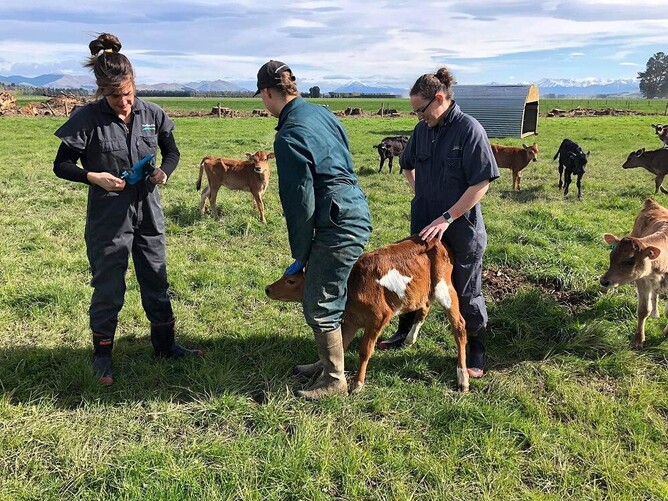Winton tech Alice shares her many years of experience with calf rearing.
Many of you will recognise Alice as one of our techs from the Winton clinic, but she's also got 9 years of calf rearing experience under her belt.
Now contract milking on a local Winton farm with her partner, she raises 200 replacements each year, as well as 50-60 beefies. We caught up with her to find out her top tips and tricks for a successful season.
It’s calving time - what does your morning look like on-farm?
Our morning starts with collecting the motorbike and full milk trailer from the dairy shed and heading over to feed the calves.
Cows (and calves) love a routine, so we try to stick to the same feeding times daily.
I feed my younger calves first, to avoid cross-contamination from the older girls' pens. This practice is worthwhile maintaining throughout the season.
The new calves have a good feed of warm, high quality colostrum. I get multiple buckets of colostrum from the freshly calved cows and measure each bucket with my Brix refractometers. High quality colostrum is measured at >22%. While not every bucket will be at that level, I ensure that the newest calves get the best quality available.
Each new calf gets trained straight onto the feeder. If they are struggling, they get tube fed 2L of warm colostrum, but I always try them on the feeder first. Patience is key - these calves need to be handled gently and with kindness, regardless of what else is happening on-farm.
What're your calf rearing essentials?
A milk warmer has become a game-changer for me! So easy to use.
Always carry a pocket knife, you never know when you're going to need it.
Cleaning wet weather gear and gumboots after every visit to the shed. I try to limit the farm workers/anyone else from walking through the calf pens to prevent spreading outside germs into the pens. Use a foot bath - no foot bath, no entry!
Good supply of gloves (with spares in my pocket). I also like wearing Dry Cuffs to keep my arms protected and sleeves dry. Small things can make a big difference.
Clear communication. I prefer to work alone, as I know what has been done and what needs to be done. However, this isn't always sustainable, especially when you have children or another job. Having clear protocols for staff to follow means they know how to help when they can.
Spray out the pens regularly. I use a spray backpack which makes it easier to do. Keeping things easy is key!
Do you do anything a little different in your pens?
We use big balls in each pen for a playing device - the calves love it! I have also seen broom ends used as scratching poles and balls hanging from roof rafters. There is nothing better than seeing happy, healthy calves playing after they have had a bellyful of milk.
Things like this may seem non-essential during a busy time on-farm, but stopping calves from being bored can prevent them from sucking or chewing on things they aren't supposed to.
What advice would you give to those new to calf rearing?
I love meeting calf rearers when out on calls with VetSouth, as we get to trade stories and ideas. Seeing the pride we take in our work is great for the industry.
If you're new to calf rearing, VetSouth offers a WelCalf programme, where we can come out and give recommendations on your shed and offer you the best calf rearing advice.
We can even check the total proteins in your calves’ blood to see how well any colostrum has transferred to the calf. (Read about Failure of Passive Transfer).
What challenges do you often see in sheds?
Coming into disbudding time as a vet tech, we can go to 3-5 different calf sheds per day, so we see all different kinds of great setups and beautiful calves. It's also reassuring to see that we all face similar problems, like overcrowding during pinch points in the season, and discuss different ways of managing it.
Talk to your techs next time we are at your shed - we are always happy to help problem solve!
Each farm is unique, but I have taken away some great ideas seeing how other farms rear their calves. How each pen is set up can make life so much easier. Easy access into pens, so you’re not trying to climb over fences and gates, makes a huge difference!
Any final words of wisdom for calf rearers this season?
Look after yourself! If you don't look after yourself, you can't look after the calves. It’s not a rush, just take your time and if you need help, ask.
Good luck for a successful calving and calf rearing season!

